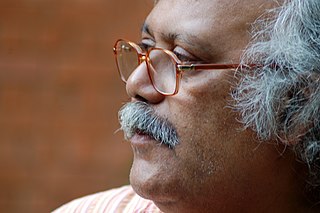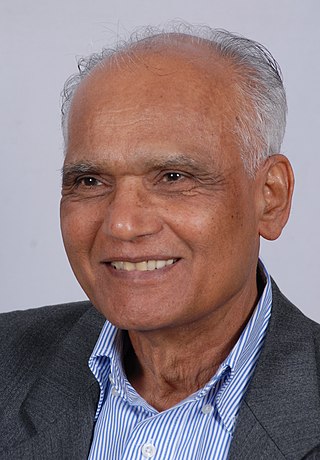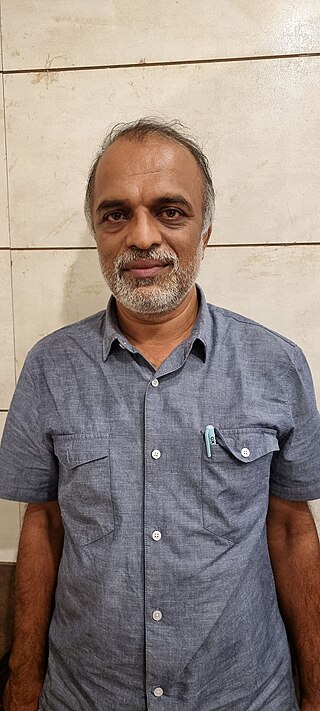
Kannada literature is the corpus of written forms of the Kannada language, spoken mainly in the Indian state of Karnataka and written in the Kannada script.

Sudha Murty is an Indian educator, author, philanthropist and former chairperson of the Infosys Foundation. She is married to the co-founder of Infosys, N. R. Narayana Murty. In 2024, Murty was nominated as Member of Parliament, Rajya Sabha on 8th March 2024 for her contribution on Social work & Education. Murty was awarded the Padma Shri, the fourth highest civilian award in India, for social work by the Government of India in 2006. Later in 2023, she was awarded the Padma Bhushan, the third highest civilian award in India.

Girish Karnad was an Indian actor, film director, Kannada writer, playwright and a Jnanpith awardee, who predominantly worked in Kannada, Hindi, Tamil, Telugu, Malayalam and Marathi films. His rise as a playwright in the 1960s marked the coming of age of modern Indian playwriting in Kannada, just as Badal Sarkar did in Bengali, Vijay Tendulkar in Marathi, and Mohan Rakesh in Hindi. He was a recipient of the 1998 Jnanpith Award, the highest literary honour conferred in India.

Udupi Rajagopalacharya Ananthamurthy was an Indian contemporary writer and critic in the Kannada language. He was born in Thirtahalli Taluk and is considered one of the pioneers of the Navya movement. In 1994, he became the sixth Kannada writer to be honored with the Jnanpith Award, the highest literary honour conferred in India. In 1998, he received the Padma Bhushan award from the Government of India. He was the vice-chancellor of Mahatma Gandhi University in Kerala during the late 1980s. He was one of the finalists of Man Booker International Prize for the year 2013. He remained a fervent critic of nationalistic political parties until his death from kidney failure and cardiac arrest on 22 August 2014.

Guggari Shanthaveerappa Shivarudrappa, or colloquially GSS, was an Indian Kannada poet, writer, and researcher who was awarded the title of Rashtrakavi by the Government of Karnataka in 2006.
M. Chidananda Murthy was a Kannada writer, researcher and historian. He was a well-known scholar in Karnataka specializing in the history of Kannada language and ancient Karnataka. He was also known for his campaign to conserve the monuments Hampi and to secure classical language status to Kannada Language. Murthy also articulated that uniform civil code and an anti-conversion law must be enacted by the Government in India.

Mysore literature in Kannada is a body of literature composed in the Kannada language in the historical Kingdom of Mysore in Southern India and written in the Kannada script. The writings date from the Kingdom of Mysore, which existed from around 1600 CE until the establishment of modern India in 1947. Many of the works of this literature written on religious themes are labeled Veerashaiva or Vaishnava in acknowledgment of the two faiths that gave form to the literature and fostered it until the advent of the modern era. Despite a gradual decline in the popularity of Jainism, authors devoted to the faith produced some works of merit. Secular themes dealing with a wide range of subjects were also written on. Kannada literature flourished for a short while in the court of the neighbouring kingdom of the Nayakas of Keladi whose territory was annexed by Mysore in 1763.

Jayant Kaikini is a poet, short story writer, playwright, columnist in Kannada and a lyricist in Kannada cinema. He has so far published six anthologies of short stories, four books of poetry, three plays and a collection of essays. He is valued as one of the best writers in Kannada literature and has revolutionized the field by giving it a fresh new perspective. He has bagged many notable awards like 'Karnataka Sahitya Academy' award, Kusumagraj Award, Katha Award, DSC Prize for South Asian Literature amidst others. Kaikini is regarded as one of the most significant writers in Kannada today. Kaikini has been conferred the honorary doctorate from Tumkur University.
Modern Kannada literature refers to the body of literature written in the Kannada language, a language spoken mainly in the Indian state of Karnataka. The Kannada script is the writing system used in Kannada literature. In the last forty years, eight modern Kannada authors have been awarded the Jnanpith award, a prestigious private literary award in India. In addition, the Sahitya Akademi Award, the second-highest award for literature granted by the Government of India, has been conferred upon Kannada writers fifty times.

Hulkuntemath Shivamurthy Sastri Shivaprakash is a leading poet and playwright writing in Kannada. He is professor at the School of Arts and Aesthetics, Jawaharlal Nehru University, New Delhi. He heads the Cultural Centre at Berlin, known as the Tagore Centre, as Director run by Indian Council for Cultural Relations (ICCR). He has seven anthologies of poems, twelve plays, and several other books to his credit. His works have been widely translated into English, French, Italian, Spanish, German, Polish, Hindi, Malayalam, Marathi, Tamil and Telugu. His plays have been performed in Kannada, Hindi, Meitei, Rabha, Assamese, Bodo, Tamil and Malayalam. Shivaprakash is also a well-known authority on vachana literature, Bhakti movements of India, and Sufi and other mystic traditions.
The Pampa Award is a literary award in the Indian state of Karnataka. The award was established in 1987 by the government of Karnataka. It is the highest literary honor conferred by the Department of Kannada and Culture, Government of Karnataka State, and recognises works written in the Kannada language.

Santeshivara Lingannaiah Bhyrappa is an Indian novelist, philosopher and screenwriter who writes in Kannada. His work is popular in the state of Karnataka and he is widely regarded as one of modern India's popular novelists. His novels are unique in terms of theme, structure, and characterization. He has been among the top-selling authors in the Kannada language and his books have been translated into Hindi and Marathi which have also been bestsellers.

Sumathendra Raghavendra Nadig was an Indian professor and writer in Kannada. Nadig came upon the literary scene as a prominent modern poet in the 1960s. He was a close associate of Gopalakrishna Adiga, the leader of the modernist movement.

R. Ganesh is a practitioner of the art of avadhana, a polyglot, an author in Sanskrit and Kannada and an extempore poet in multiple languages. He has performed more than 1300 avadhanas, in Kannada, Sanskrit, Telugu and Prakrit. He is known for extempore composition of poetry (āśukavita) during these performances, and even of chitrakavya. He is the only Śatāvadhāni from Karnataka. He once set a record by composing poetry for twenty-four hours continuously. From 30 November 2012 to 2 December 2012, he performed the first ever Shatavadhana entirely in Kannada. On 16 February 2014, in Bangalore, he performed his 1000th avadhāna.

Damodar Mauzo is an Indian short story writer, novelist, critic and script writer in Konkani. He was awarded the 57th Jnanpith Award, India's highest literary honour, in 2022, Sahitya Akademi Award in 1983 for his novel Karmelin and the Vimala V. Pai Vishwa Konkani Sahitya Puraskar award for his novel Tsunami Simon in 2011. His collection of Short stories Teresa's Man and Other Stories from Goa was nominated for the Frank O'Connor International award in 2015. He has served as a member of the executive board, general council, as well as the finance committee of the Sahitya Akademi.

Chennaveera Kanavi was an Indian Kannada language poet and author. In a career spanning over seven decades he wrote over 25 anthologies and over 28 books across genres. He was considered one of the major poets and writers in the Kannada language and received the Sahitya Akademi Award for his poem "Jeeva Dhwani" in 1981. He was popularly known as "Samanvayada Kavi", "Chembelakina Kavi", and "Soujanyada Kavi".

Vishnu Raj Atreya was a Nepali writer and poet, who wrote in Nepali language, Sanskrit language and Awadhi language. He used the title Latosaathi in his poetry works since 1963 A.D. He is considered to be the first person to start writing Haiku in Sanskrit language.

Vempalli Gangadhar is a writer from Kadapa district of Andhra Pradesh. He has been awarded Sahitya Akademi's Yuva Puraskar for 2011 for his short-story collection "Molakala Punnami".

Abdul Rasheed is an Indian writer, poet, editor and translator from Karnataka. In 2004 he won Sahitya Akademi Golden Jubilee Award for lifetime achievement. He also a translator, blogger, columnist and radio personality.

Taľaku Subbanna Venkannayya was University of Mysore's first Kannada Professor. He was also a popular Kannada writer, translator, editor and teacher who nurtured many later Kannada littérateurs like Kuvempu, D. L. Narasimhachar, T. N. Srikantaiah, K. S. Narasimhaswamy, M. V. Seetharamaiah, C. K. Venkataramaiah, K. Venkataramappa, G. Venkatasubbiah and S. V. Parameshwara Bhatta. In fact, Kuvempu begins his book Sri Ramayana Darshanam with a two-page dedication to his teacher T. S. Venkannayya. T. S. Venkannayya translated the biography of Ramakrishna Paramahamsa from Bengali into Kannada for the first time in 1919. T. S. Venkannayya along with D. V. Gundappa, V. Seetharamaiah, B. M. Srikantaiah and T. N. Srikantaiah were at the forefront of the Kannada Movement from 1920s onwards and were instrumental in the founding of Kannada Sahitya Parishat (Bangalore) and Kannada Sangha at Central College, Bangalore and Maharaja College, Mysore. T. S. Venkannayya was responsible for the organising of the 1931 Kannada Sahitya Sammelan at Mysore.

















